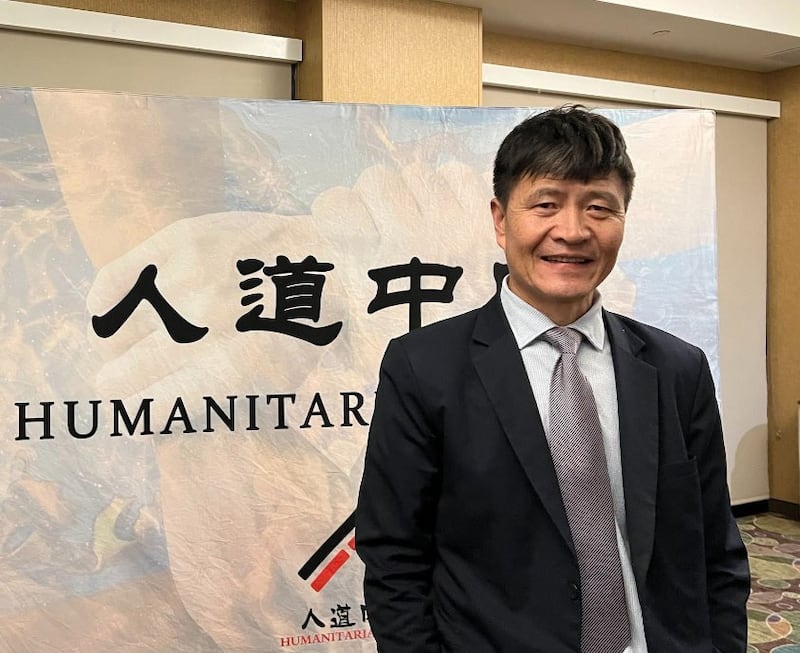Zhou Shuzhuang, a founding member of the Tiananmen Mothers victims' group that campaigns for redress over the 1989 massacre, has died in Beijing after decades of calling for justice and being ignored by the ruling Chinese Communist Party.
Zhou, who along with the other group members received a Women of Courage Award from the State Department on the anniversary of the June 4 crackdown in 2020, died at the age of 87 at her Beijing home, fellow group member Zhang Xianling told Radio Free Asia.
She never fully recovered from the death of her 24-year-old son Duan Changlong, Zhang said. He was a graduate student at Beijing's Tsinghua University when weeks of student-led democracy protests erupted onto Tiananmen Square.
The group still writes to Chinese leaders every year on the anniversary of the crackdown, calling on the ruling party to make contemporary records public, to award compensation to those who lost family members and to hold accountable those responsible for the killings.
Yet public commemoration of the massacre remains banned in China, while an annual candlelight vigil that used to mark the anniversary in Hong Kong's Victoria Park has fallen silent after more than three decades, its leaders in prison under a draconian national security law used to crack down on public dissent.
While China has never made public the numbers who died or were injured, the Tiananmen Mothers published a detailed map in 2009 showing where some of the victims died. Estimates of the death toll have ranged from a few hundred to several thousand.
Diplomatic archives declassified by the U.K. government in 2017 described troops of the People's Liberation Army 27th army as being ordered to "spare no one" as they used dum-dum bullets, automatic weapons and armored vehicles to carry out mass killings in Beijing.
Died instantly
Zhou's son Duan was shot and died instantly on June 4, 1989, as he stepped forward to try to negotiate with incoming People's Liberation Army troops near the Cultural Palace of Nationalities on the western section of Chang'an Boulevard, which leads to Tiananmen Square.
"She was among the older members of the Tiananmen Mothers, born in the same year as [our founder] Ding Zilin," Zhang said. "She was one of the first to participate, and they would often meet at her home."

While Zhou spent her last two decades living with paralysis following a stroke, she was an active member of the group in the years following the massacre.
"She would ride a bicycle [around the city] trying to find victims," Zhang said.
U.S.-based democracy activist Zhou Fengsuo, who was a student leader of the 1989 protests, said Duan was a "highly respected" member of the movement, and that the Tiananmen Mothers are held in the highest respect in the democracy movement because of their perseverance in seeking clarification, redress and compensation, year-in, year-out, routinely targeted for surveillance, yet never getting a response from the government.
"It's been 35 years now, and many of them were in their 40s and 50s [in 1989]," Zhou Fengsuo said. "Now they are getting old, and are passing away one by by one."
"It has really been too long a road for them, yet they have persisted until the end of their lives, to their last breath."
‘Pain in their hearts’
Zhang said many of the group's members didn't go to Zhou Shuzhuang's funeral, for fear of picking up a respiratory infection, but sent floral tributes instead.
She said the early meetings at Zhou's home had also provided an opportunity to group members to "chat to relieve the pain in their hearts," and also to think of ways to "seek justice" for their lost loved ones.
The Tiananmen Mothers have said their Women of Courage award was significant for its honoring of lost lives, and represented a condemnation of atrocities committed by the Chinese Communist Party in 1989.
Founding member Ding Zilin, whose 17-year-old son Jiang Jielian was gunned down by People's Liberation Army troops after Communist Party elder Deng Xiaoping ordered the army into Beijing, has been the target of ongoing harassment and surveillance by the state security police, along with many other group members.
Translated by Luisetta Mudie. Edited by Malcolm Foster.
